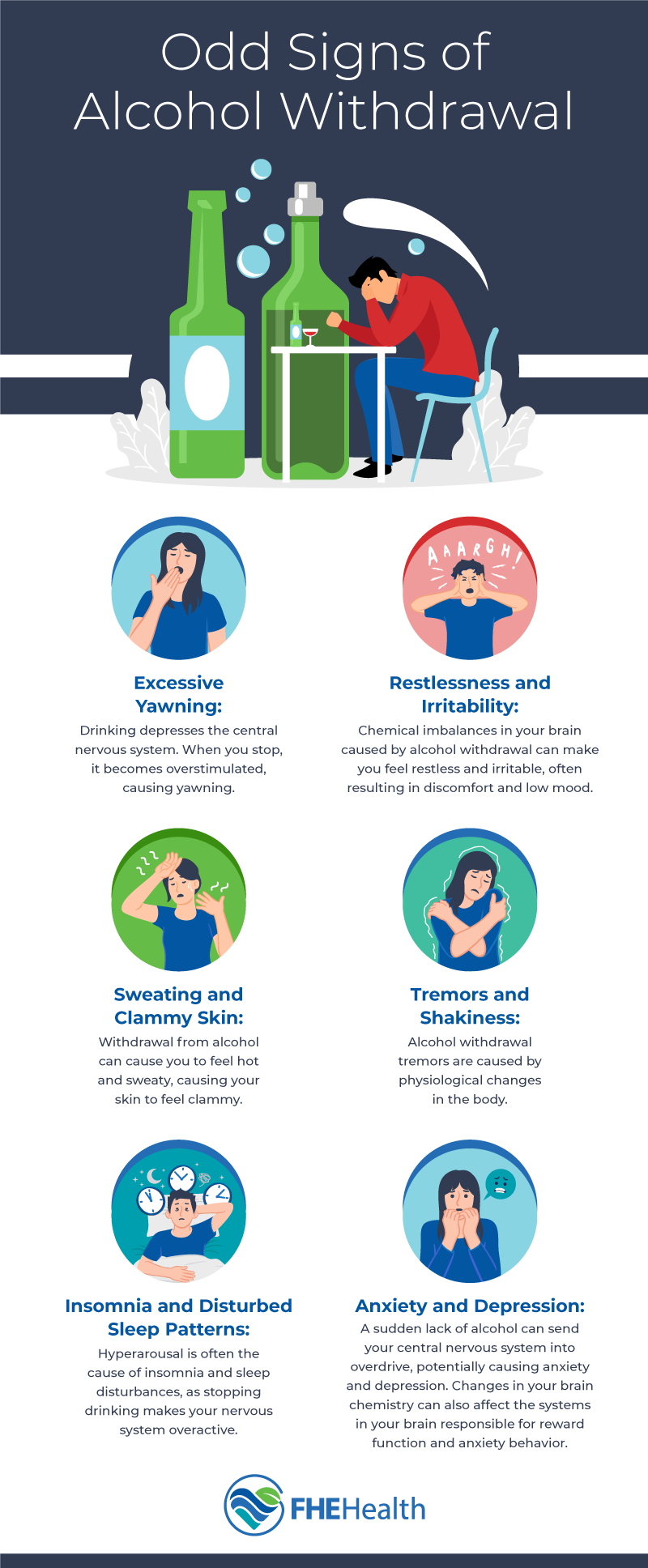
Many people who want to stop drinking worry about withdrawal symptoms. Knowing what to expect and understanding how your medical team can help you manage your symptoms can make the decision to enter a detox program easier. Below, we’ll outline some of the more unusual symptoms you may experience when you stop drinking and explore the link between hallucinations and alcohol withdrawal.

Excessive Yawning
Yawning is a sign of withdrawal from alcohol, but it’s more commonly associated with opioid withdrawal. You may notice yourself yawning more than usual within 24 to 48 hours of stopping drinking or significantly reducing your alcohol intake, but it can sometimes begin within hours. Typically, withdrawal lasts between 1 and 3 days, but it could last up to 7 days in some people.
So, why does alcohol withdrawal cause yawning? Alcohol depresses your central nervous system, affecting the balance of certain neurotransmitters in your brain. When you stop drinking, your central nervous system is no longer depressed, causing it to become overstimulated. This excitation causes many of the unpleasant symptoms associated with alcohol withdrawal. While yawning is a relatively harmless side effect, it’s a sign of physiological changes in your body.
Restlessness and Irritability
The chemical imbalances in your brain caused by alcohol withdrawal can also make you feel restless and irritable, often resulting in discomfort and low mood. These symptoms usually manifest within a few hours of reducing or stopping drinking. While feeling edgy and irritable can be distressing, these feelings typically resolve quickly — even if you don’t receive specialized withdrawal treatment. Most people start feeling better within a few hours to a few days.
Sweating and Clammy Skin
Many people feel hot and sweaty during alcohol withdrawal, and their skin may feel clammier than usual. You’ll likely experience sweating within 5 to 10 hours of stopping drinking, reaching its highest intensity within a day or two of your last drink.
Tremors and Shakiness
Alcohol withdrawal often results in involuntary shaking, most commonly in your hands. Many people find this symptom particularly distressing and wonder whether the emotional stress of withdrawal is to blame. However, research shows that alcohol withdrawal tremors are caused by physiological changes in the body and have different characteristics than anxiety- and stress-related tremors.
If you experience withdrawal tremors, they’ll likely start within 5 to 10 hours of your last drink. Fortunately, these tremors usually clear up on their own after a few days.
Insomnia and Disturbed Sleep Patterns
When you stop drinking, problems falling or staying asleep and changes to your normal sleep patterns are common. Some of the psychological effects of alcohol withdrawal, such as feelings of panic, agitation or restlessness, can also make it harder to sleep well. You may experience unusually frightening or vivid dreams during this time.
Hyperarousal is often the cause of insomnia and sleep disturbances, as stopping drinking makes your nervous system overactive. These symptoms can start within a few hours of quitting drinking, and how much you habitually drink can affect whether you experience sleep problems. Sleep issues are more likely to impact people who drink particularly heavily.
Anxiety and Depression
A sudden lack of alcohol can send your central nervous system into overdrive, potentially causing anxiety and depression. Furthermore, changes in your brain chemistry can affect the systems in your brain responsible for reward function and anxiety behavior, making mental health problems more likely.
Alcohol withdrawal depression and anxiety typically show up within a few hours of cutting down or quitting alcohol, and you may experience symptoms sooner if you’re a very heavy drinker. Your health care provider may recommend medication to soothe the nervous system while your body gets used to the change. These medications can also help reduce sleep disturbances. However, they won’t be suitable for every person, so it’s important to discuss your options with a medical professional to make the safest choice for your circumstances.
Hallucinations and Alcohol Withdrawal
Hallucinations are a more unusual, serious complication of alcohol withdrawal. Hallucinations during alcohol withdrawal may include seeing or hearing nonexistent things or feeling strange sensations in your body without an external cause. Most people who experience alcohol withdrawal hallucinations start getting symptoms within 1 to 2 days of their last drink, and the issue is more common in people who drink exceptionally large amounts. The following factors could also increase your risk of withdrawal hallucinations and other severe manifestations:
- Being alcohol-dependent for a long time
- Liver problems
- Previous attempts to withdraw from alcohol, especially if you experienced severe symptoms during a prior detox
- Using additional drugs
- Older age
- Feeling an intense desire to drink alcohol during detox
During a withdrawal-related hallucination, you’ll usually remain fully aware of what’s happening around you. Some people experience other symptoms before hallucinations start, but that’s not always the case. Sometimes, hallucinations can be the first symptom of alcohol withdrawal.
If you experience alcohol withdrawal hallucinations, your doctor may prescribe medications to reduce your symptoms. Some of these medications can also reduce your risk of encountering other serious side effects, such as seizures.
Seizures
Seizures are a relatively uncommon symptom of alcohol withdrawal. The risk factors for hallucinations can also increase your chance of experiencing seizures. Scientists believe withdrawal seizures occur due to rapid changes in your brain chemistry after you stop drinking.
Most people who experience this symptom only have a single seizure. However, some people experience multiple or constant seizures, which is a medical emergency. Therefore, withdrawing from alcohol under medical supervision is essential so your health care professional can assess your risk of complications and prescribe treatments to prevent seizures and other problems.
Get Expert Help Today
Withdrawing from alcohol can be a daunting prospect, but you don’t have to face it alone. Withdrawing from alcohol with help from addiction experts is the safest way to detox and achieve a healthier future. At FHE Health, our knowledgeable, experienced team can help you find the right treatment to manage withdrawal symptoms and address the root causes of problem drinking. Schedule a consultation today to learn how FHE Health can help you or someone you love.






